The Kerala High Court on Tuesday held that the retrospective operation of a Government Order cannot be permitted particularly when it is merely an executive order, and not a legislation. Justice Devan Ramachandran observed that the petitioner joined the University unaware of any conditions as put forth by the subsequent Government order; therefore, the retrospective operation of the order...

